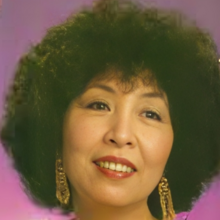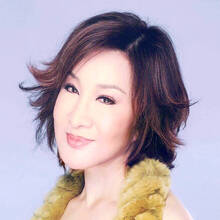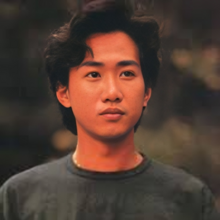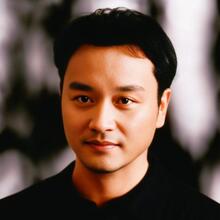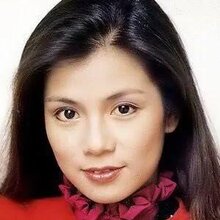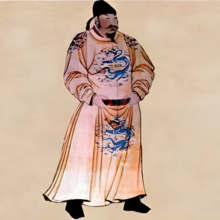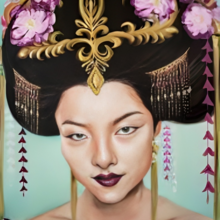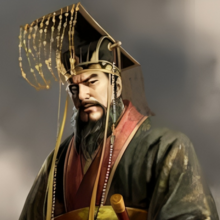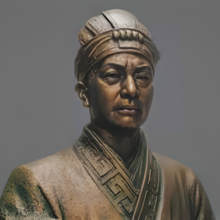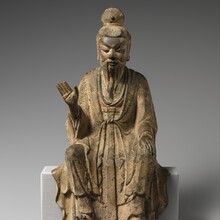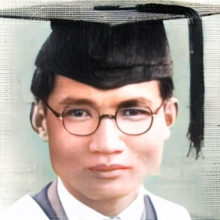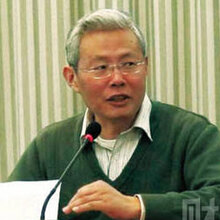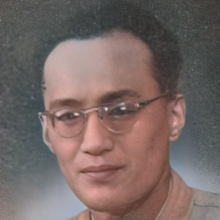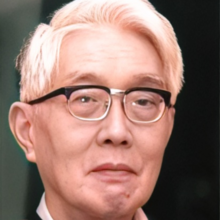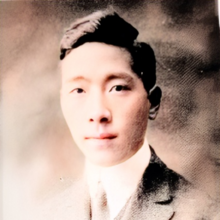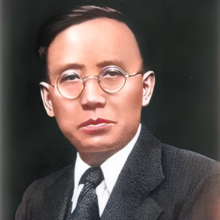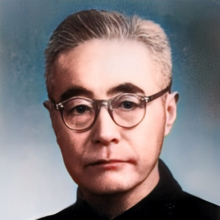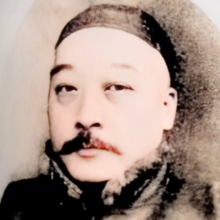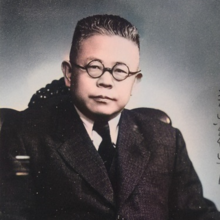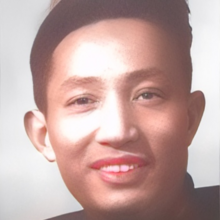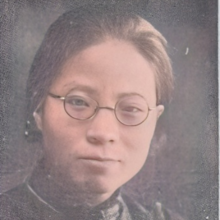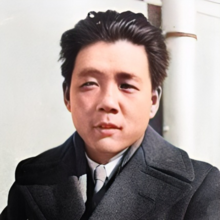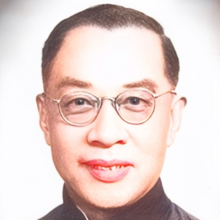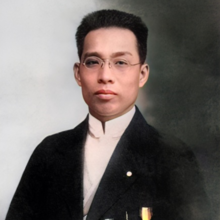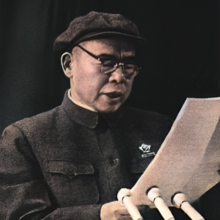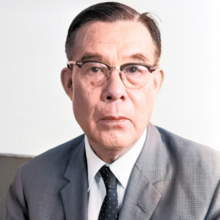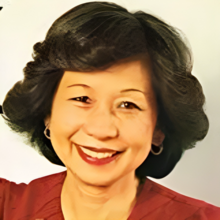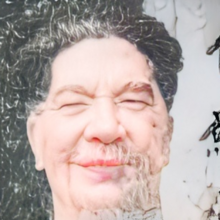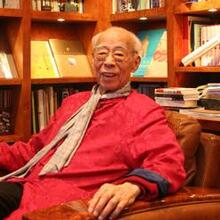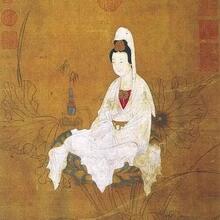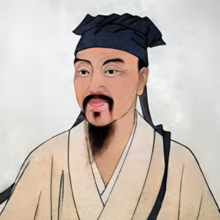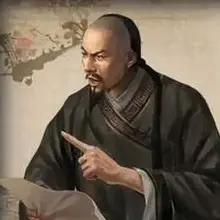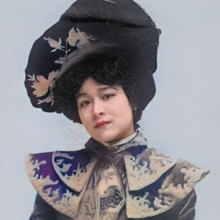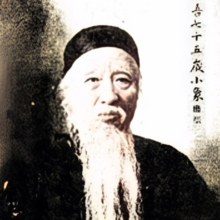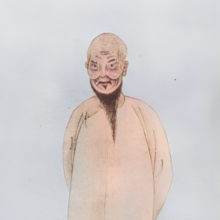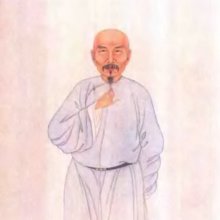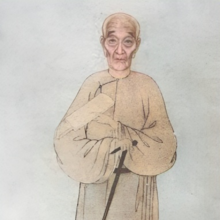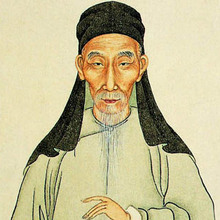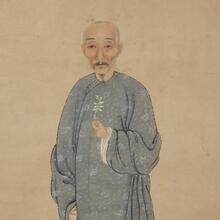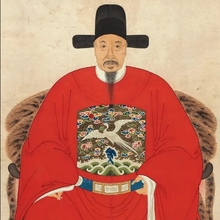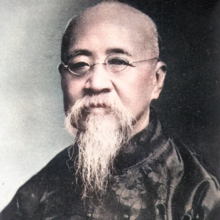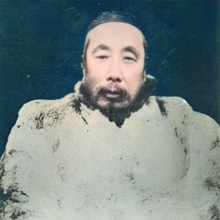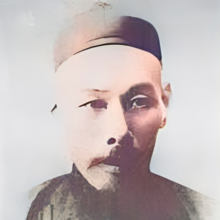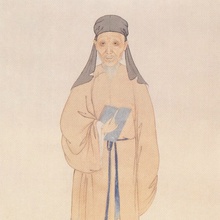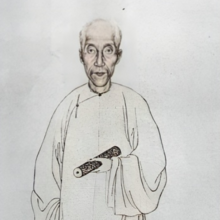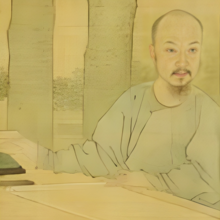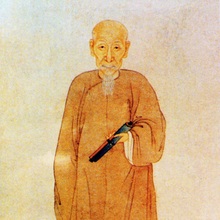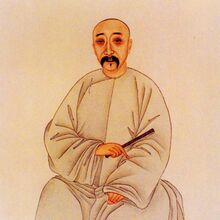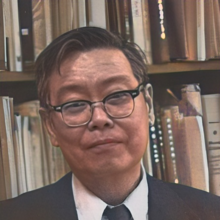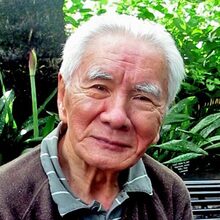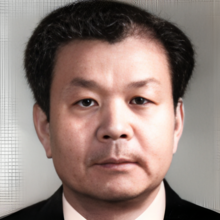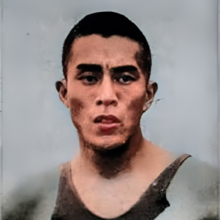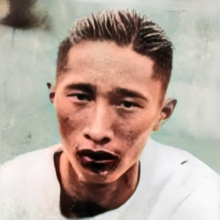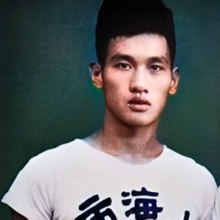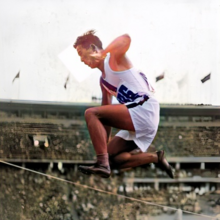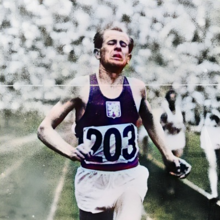 Luo Ping
1733 - 1799
Painter of the Qing Dynasty
Luo Ping
1733 - 1799
Painter of the Qing Dynasty
 Chen Kingkwan
1913 - 2000
sprinter
Chen Kingkwan
1913 - 2000
sprinter
 Bao Shichen
1775 - 1855
Calligraphe, reformist scholar of the Qing dynasty
Bao Shichen
1775 - 1855
Calligraphe, reformist scholar of the Qing dynasty
 Tong Dizhou
1902 - 1979
Embryology, cloning, fish biology
Tong Dizhou
1902 - 1979
Embryology, cloning, fish biology
 Lin Dai
1934 - 1964
Actress and singer of Mandarin films
Lin Dai
1934 - 1964
Actress and singer of Mandarin films
 Chen Tingjing
1746 - 1809
Historian, reformist scholar of the Qing dynasty
Chen Tingjing
1746 - 1809
Historian, reformist scholar of the Qing dynasty
 Chou Wen chung
1923 - 2019
Composer of contemporary classical music
Chou Wen chung
1923 - 2019
Composer of contemporary classical music
 Qu Bo
1923 - 2002
Writer and novelist
Qu Bo
1923 - 2002
Writer and novelist
 Zhao Zhongxiang
1942 - 2020
News anchor on Xinwen Lianbo and television
Zhao Zhongxiang
1942 - 2020
News anchor on Xinwen Lianbo and television
 Huang Zunxian
1848 - 1905
Poet and diplomat
Huang Zunxian
1848 - 1905
Poet and diplomat
 Deng Xiaoping
1904 - 1997
Chairman of the Central Advisory Commission
Deng Xiaoping
1904 - 1997
Chairman of the Central Advisory Commission
 Tien Feng
1928 - 2015
actor and martial artist
Tien Feng
1928 - 2015
actor and martial artist
 Yuan Shikai
1859 - 1916
President and Emperor of China
Yuan Shikai
1859 - 1916
President and Emperor of China
 Cao Yu
1910 - 1996
dramatist of modern Chinese spoken
Cao Yu
1910 - 1996
dramatist of modern Chinese spoken
 Nellie Yu Roung Ling
1882 - 1973
Dancer and lady-in-waiting
Nellie Yu Roung Ling
1882 - 1973
Dancer and lady-in-waiting
 Weng Zhanqiu
1900 - 1945
Painter and writer
Weng Zhanqiu
1900 - 1945
Painter and writer
 Ho Ying-chin
1890 - 1987
Premier of the Republic of China
Ho Ying-chin
1890 - 1987
Premier of the Republic of China
 Yao Beina
1981 - 2015
Singer and songwriter
Yao Beina
1981 - 2015
Singer and songwriter
 Chang Chun
1901 - 1986
Premier of the Republic of China
Chang Chun
1901 - 1986
Premier of the Republic of China
 Jia Hongsheng
1967 - 2010
Actor who became known in the late 1980s
Jia Hongsheng
1967 - 2010
Actor who became known in the late 1980s
 Gu Jiegang
1893 - 1980
Historian, philosopher, writer
Gu Jiegang
1893 - 1980
Historian, philosopher, writer
 Chan Yik Yan
1909 - 1982
Xinyi master
Chan Yik Yan
1909 - 1982
Xinyi master
 Feng Yunhe
1898 - 1988
Chemical engineer and Minister of Textile Industry
Feng Yunhe
1898 - 1988
Chemical engineer and Minister of Textile Industry
 Sha Fei
1912 - 1950
Photojournalist and war photographer
Sha Fei
1912 - 1950
Photojournalist and war photographer
 Li Jieshou
1924 - 2023
Surgeon and academician
Li Jieshou
1924 - 2023
Surgeon and academician
 Gao Hua
1954 - 2011
History professor at Nanjing University
Gao Hua
1954 - 2011
History professor at Nanjing University
 Fou Ts ong
1934 - 2020
Pianist of contemporary classical music
Fou Ts ong
1934 - 2020
Pianist of contemporary classical music
 Wu Yin
1909 - 1991
Actress
Wu Yin
1909 - 1991
Actress
 Qian Nengxun
1869 - 1924
Premier of the Republic of China
Qian Nengxun
1869 - 1924
Premier of the Republic of China
 Hong Liangji
1746 - 1809
Historian, reformist scholar of the Qing dynasty
Hong Liangji
1746 - 1809
Historian, reformist scholar of the Qing dynasty
 Guan Zilan
1903 - 1986
Avant-garde painter
Guan Zilan
1903 - 1986
Avant-garde painter
 Wang Fuzhi
1619 - 1692
Philosopher, historian, poet
Wang Fuzhi
1619 - 1692
Philosopher, historian, poet
 Feng Youlan
1895 - 1990
Philosopher, historian, and writer
Feng Youlan
1895 - 1990
Philosopher, historian, and writer
 Chen Xuezhao
1906 - 1996
Writer and journalist
Chen Xuezhao
1906 - 1996
Writer and journalist
 Xu Zhimo
1897 - 1931
Poet and writer of modern Chinese literature
Xu Zhimo
1897 - 1931
Poet and writer of modern Chinese literature
 Sun Zongwei
1912 - 1979
Gongbi painter
Sun Zongwei
1912 - 1979
Gongbi painter
 Chen Boda
1904 - 1989
Journalist and political theorist
Chen Boda
1904 - 1989
Journalist and political theorist
 Meng Tian
-300 - -210
general and architect
Meng Tian
-300 - -210
general and architect
 Chao Yuen Ren
1892 - 1982
Linguistics, phonology, music, literature
Chao Yuen Ren
1892 - 1982
Linguistics, phonology, music, literature
 Yang Jianhou
1839 - 1917
Master of Yang-style tai chi
Yang Jianhou
1839 - 1917
Master of Yang-style tai chi
 Hong Yi
1880 - 1942
Painter of the Yangzhou school
Hong Yi
1880 - 1942
Painter of the Yangzhou school
 Liu Shaoqi
1898 - 1969
President of the People's Republic of China
Liu Shaoqi
1898 - 1969
President of the People's Republic of China
 Sun Yun-suan
1913 - 2006
Premier of the Republic of China
Sun Yun-suan
1913 - 2006
Premier of the Republic of China
 Ruan Yuan
1764 - 1849
Poet, historian, politician
Ruan Yuan
1764 - 1849
Poet, historian, politician
 Ruan Lingyu
1910 - 1935
Silent film actress
Ruan Lingyu
1910 - 1935
Silent film actress
 Chen Qiang
1918 - 2012
Actor and comedian known for his performances
Chen Qiang
1918 - 2012
Actor and comedian known for his performances
 Li Yong
1968 - 2018
Television host on China Central Television (CCTV)
Li Yong
1968 - 2018
Television host on China Central Television (CCTV)
 Fang Weiyi
1869 - 1927
Writer and historian
Fang Weiyi
1869 - 1927
Writer and historian
 Charles Kao
1933 - 2018
Fiber optics,electrical engineering
Charles Kao
1933 - 2018
Fiber optics,electrical engineering
 Kung Hsiang hsi
1881 - 1967
Premier of the Republic of China
Kung Hsiang hsi
1881 - 1967
Premier of the Republic of China
 Tan Yankai
1869 - 1923
Acting President and Premier
Tan Yankai
1869 - 1923
Acting President and Premier
 Huang Zuolin
1906 - 1994
Playwright, director, administrator, theorist
Huang Zuolin
1906 - 1994
Playwright, director, administrator, theorist
 Lai Afong
1838 - 1890
Photographer
Lai Afong
1838 - 1890
Photographer
 Zaitao
1887 - 1970
Military leader and diplomat
Zaitao
1887 - 1970
Military leader and diplomat
 Hu Shih
1891 - 1962
Philosopher, diplomat, and educator
Hu Shih
1891 - 1962
Philosopher, diplomat, and educator
 Zheng Xie
1693 - 1765
Painter and calligrapher
Zheng Xie
1693 - 1765
Painter and calligrapher
 Teresa Teng
1953 - 1995
Singer of folk and romantic songs
Teresa Teng
1953 - 1995
Singer of folk and romantic songs
 Chino Rodriguez
1954 - 2020
Pianist of contemporary classical music
Chino Rodriguez
1954 - 2020
Pianist of contemporary classical music
 Shi Huangdi
259 - 210
First emperor of China
Shi Huangdi
259 - 210
First emperor of China
 Zheng Zhengqiu
1889 - 1935
Film writer and director
Zheng Zhengqiu
1889 - 1935
Film writer and director
 Wu Tingfang
1842 - 1922
Minister of Foreign Affairs of the Republic
Wu Tingfang
1842 - 1922
Minister of Foreign Affairs of the Republic
 Xiong Shili
1885 - 1968
Philosopher and founder
Xiong Shili
1885 - 1968
Philosopher and founder
 V K Wellington Koo Wei chun
1888 - 1985
Diplomat and statesman of the Republic of China
V K Wellington Koo Wei chun
1888 - 1985
Diplomat and statesman of the Republic of China
 Zhao Mengfu
1254 - 1322
Painter and calligrapher of the Yuan dynasty
Zhao Mengfu
1254 - 1322
Painter and calligrapher of the Yuan dynasty
 Chang Cheh
1923 - 2002
Martial arts director
Chang Cheh
1923 - 2002
Martial arts director
 Hsiao-Ping Yang
1944 - 2023
Singer and actor
Hsiao-Ping Yang
1944 - 2023
Singer and actor
 Yuan Mei
1716 - 1798
Poet and painter of the Qing Dynasty
Yuan Mei
1716 - 1798
Poet and painter of the Qing Dynasty
 Yan Huiqing
1877 - 1950
Diplomat and politician
Yan Huiqing
1877 - 1950
Diplomat and politician
 Jiang Zemin
1926 - 2022
General secretary of the Chinese Communist
Jiang Zemin
1926 - 2022
General secretary of the Chinese Communist
 Qiu Ying
1494 - 1552
Gongbi painter
Qiu Ying
1494 - 1552
Gongbi painter
 Wu Guanzhong
1919 - 2010
Painter and writer
Wu Guanzhong
1919 - 2010
Painter and writer
 Wu Zuoren
1908 - 1997
Painter, educator, stamp designer
Wu Zuoren
1908 - 1997
Painter, educator, stamp designer
 Xiao Hong
1911 - 1942
Writer ,novelist of modern Chinese literature
Xiao Hong
1911 - 1942
Writer ,novelist of modern Chinese literature
 Feng Guozhang
1859 - 1919
President of the Republic of China
Feng Guozhang
1859 - 1919
President of the Republic of China
 Lu Shijia
1911 - 1986
physicist and aerospace engineer
Lu Shijia
1911 - 1986
physicist and aerospace engineer
 Wang Hui
1632 - 1717
Landscape painter and theorist
Wang Hui
1632 - 1717
Landscape painter and theorist
 Chang Ch ung ho
1914 - 2015
Poet, calligrapher, educator
Chang Ch ung ho
1914 - 2015
Poet, calligrapher, educator
 Hao Weizhen
1842 - 1920
Wu-style tai chi master
Hao Weizhen
1842 - 1920
Wu-style tai chi master
 Ryu Ryu Ko
1793 - 1882
Fujian White Crane Kung Fu master
Ryu Ryu Ko
1793 - 1882
Fujian White Crane Kung Fu master
 Zhou Tong
1060 - 1121
Archery teacher of Yue Fei
Zhou Tong
1060 - 1121
Archery teacher of Yue Fei
 Eileen Chang
1920 - 1995
Writer and screenwriter
Eileen Chang
1920 - 1995
Writer and screenwriter
 Bella Yao
1981 - 2015
Singer and songwriter
Bella Yao
1981 - 2015
Singer and songwriter
 Pu Jiexiu
1907 - 2000
Entrepreneur and former Vice Chair
Pu Jiexiu
1907 - 2000
Entrepreneur and former Vice Chair
 Lin Sen
1868 - 1943
Chairman of the National Government
Lin Sen
1868 - 1943
Chairman of the National Government
 Fu Biao
1963 - 2005
actor and comedian
Fu Biao
1963 - 2005
actor and comedian
 Hu Sheng
1918 - 2000
Marxist theorist, historian, politician
Hu Sheng
1918 - 2000
Marxist theorist, historian, politician
 Coco Lee
1975 - 2023
Mandopop star and Disney voice actress
Coco Lee
1975 - 2023
Mandopop star and Disney voice actress
 Sun Fo
1891 - 1973
Premier of the Republic of China
Sun Fo
1891 - 1973
Premier of the Republic of China
 Hou Bo
1924 - 2017
Photographer of Mao Zedong
Hou Bo
1924 - 2017
Photographer of Mao Zedong
 Yang Shoujing
1839 - 1915
Minister of Justice and historian
Yang Shoujing
1839 - 1915
Minister of Justice and historian
 Ye Duzheng
1916 - 2013
Atmospheric physics, climate change,
Ye Duzheng
1916 - 2013
Atmospheric physics, climate change,
 Luo Zhenyu
1866 - 1940
Classical scholar and epigrapher
Luo Zhenyu
1866 - 1940
Classical scholar and epigrapher
 Chiang Kai shek
1893 - 1976
Founder of the People's Republic of China
Chiang Kai shek
1893 - 1976
Founder of the People's Republic of China
 Wen Boren
1558 - 1639
Landscape painter, calligrapher and essayist
Wen Boren
1558 - 1639
Landscape painter, calligrapher and essayist
 Shao Hua
1938 - 2008
Photographer and major general
Shao Hua
1938 - 2008
Photographer and major general
 Lin Huiyin
1904 - 1955
Architect and writer
Lin Huiyin
1904 - 1955
Architect and writer
 Chen Jiru
1558 - 1639
Landscape painter, calligrapher and essayist
Chen Jiru
1558 - 1639
Landscape painter, calligrapher and essayist
 Tsin Ting
1934 - 2022
Punjabi folk singer and dubbing artist
Tsin Ting
1934 - 2022
Punjabi folk singer and dubbing artist
 Dong Biwu
1886 - 1975
Acting Chairman and Vice Chairman
Dong Biwu
1886 - 1975
Acting Chairman and Vice Chairman
 Wei Yuan
1794 - 1857
Poet, historian, politician
Wei Yuan
1794 - 1857
Poet, historian, politician
 Huang Xianfan
1899 - 1982
Zhuang studies and Chinese history
Huang Xianfan
1899 - 1982
Zhuang studies and Chinese history
 Zhu De
1886 - 1976
Founder and leader of the Chinese Red Army
Zhu De
1886 - 1976
Founder and leader of the Chinese Red Army
 Fu Bingchang
1895 - 1965
Ambassador to the Soviet Union
Fu Bingchang
1895 - 1965
Ambassador to the Soviet Union
 Guangzong
1147 - 1200
Emperor of the Song dynasty
Guangzong
1147 - 1200
Emperor of the Song dynasty
 Gao Fenghan
1683 - 1749
Painter of the Yangzhou school
Gao Fenghan
1683 - 1749
Painter of the Yangzhou school
 Zhao Ziyang
1919 - 2005
General Secretary of the Chinese Communist Party
Zhao Ziyang
1919 - 2005
General Secretary of the Chinese Communist Party
 Li Shu-hua
1890 - 1979
Physics, diplomacy, education
Li Shu-hua
1890 - 1979
Physics, diplomacy, education
 Yi Xing
683 - 727
Astronomer, Buddhist monk, inventor
Yi Xing
683 - 727
Astronomer, Buddhist monk, inventor
 Sun Yu
1900 - 1990
Film director and screenwriter
Sun Yu
1900 - 1990
Film director and screenwriter
 Guo Wei
904 - 954
Founder of the Later Zhou dynasty
Guo Wei
904 - 954
Founder of the Later Zhou dynasty
 Chen Yunshang
1919 - 2016
Actress and singer
Chen Yunshang
1919 - 2016
Actress and singer
 Chen Liting
1910 - 2013
Film director and screenwriter
Chen Liting
1910 - 2013
Film director and screenwriter
 Ito Hirobumi
1841 - 1909
Prime Minister of Japan and genrō
Ito Hirobumi
1841 - 1909
Prime Minister of Japan and genrō
 Yan Huizhu
1919 - 1966
Classical Chinese opera singer
Yan Huizhu
1919 - 1966
Classical Chinese opera singer
 Yu Kuo-hwa
1914 - 2000
Premier of the Republic of China
Yu Kuo-hwa
1914 - 2000
Premier of the Republic of China
 Gao Lingwen
1862 - 1945
Historian, linguist, writer
Gao Lingwen
1862 - 1945
Historian, linguist, writer
 Lam Qua
1801 - 1860
Painter of Western-style portraits
Lam Qua
1801 - 1860
Painter of Western-style portraits
 Wang Ziping
1881 - 1973
Kung fu master , traditional medicine practitioner
Wang Ziping
1881 - 1973
Kung fu master , traditional medicine practitioner
 Feng Yidai
1913 - 2005
Writer, editor, and translator
Feng Yidai
1913 - 2005
Writer, editor, and translator
 Guo Jie
1912 - 2015
Discus thrower
Guo Jie
1912 - 2015
Discus thrower
 Laozi
-551 - -479
Founder of Taoism
Laozi
-551 - -479
Founder of Taoism
 Hu Weide
1863 - 1933
Premier of the Republic of China
Hu Weide
1863 - 1933
Premier of the Republic of China
 Kulap Saipradit
1906 - 1974
Novelist
Kulap Saipradit
1906 - 1974
Novelist
 Soong Mei-ling
1898 - 2003
First Lady of the Republic of China
Soong Mei-ling
1898 - 2003
First Lady of the Republic of China
 Cai Tsungyi
1914 - 1960
Racewalking
Cai Tsungyi
1914 - 1960
Racewalking
 Zhang Jinlin
1936 - 2023
Chief designer nuclear submarine project
Zhang Jinlin
1936 - 2023
Chief designer nuclear submarine project
 Yang Shangkun
1907 - 1998
President of the People's Republic of China
Yang Shangkun
1907 - 1998
President of the People's Republic of China
 Soong Tse vung
1894 - 1971
Premier of the Republic of China
Soong Tse vung
1894 - 1971
Premier of the Republic of China
 Feng Yuanjun
1900 - 1974
Religious history, Yuan Dynasty history
Feng Yuanjun
1900 - 1974
Religious history, Yuan Dynasty history
 Fu Baolu
1913 - 1943
Pole vaulter
Fu Baolu
1913 - 1943
Pole vaulter
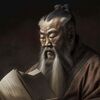 Confucius
-551 - -479
Confucius
-551 - -479
 Xu Ke
1869 - 1927
Viceroy of Sichuan, Huguang
Xu Ke
1869 - 1927
Viceroy of Sichuan, Huguang
 Danny Chan
1958 - 1993
Singer, songwriter and actor
Danny Chan
1958 - 1993
Singer, songwriter and actor
 Yen Chia kan
1905 - 1993
President of the Republic of China
Yen Chia kan
1905 - 1993
President of the Republic of China
 Chan Tai San
1920 - 2004
Lama Pai, Choy Lay Fut,other martial arts styles
Chan Tai San
1920 - 2004
Lama Pai, Choy Lay Fut,other martial arts styles
 Li Xiannian
1909 - 1992
President of the People's Republic of China
Li Xiannian
1909 - 1992
President of the People's Republic of China
 Huang Zongxi
1610 - 1695
Classical scholar and political theorist
Huang Zongxi
1610 - 1695
Classical scholar and political theorist
 Peng Xiaolian
1953 - 2019
Film director, scriptwriter and author
Peng Xiaolian
1953 - 2019
Film director, scriptwriter and author
 Shangguan Yunzhu
1920 - 1968
Actress and singer
Shangguan Yunzhu
1920 - 1968
Actress and singer
 Zhou Chen
1460 - 1535
Landscape painter, calligrapher and essayist
Zhou Chen
1460 - 1535
Landscape painter, calligrapher and essayist
 Xu Wei
1521 - 1593
Painter and poet of the Ming dynasty
Xu Wei
1521 - 1593
Painter and poet of the Ming dynasty
 Yan Wenliang
1893 - 1988
Painter and calligrapher of the Qing dynasty
Yan Wenliang
1893 - 1988
Painter and calligrapher of the Qing dynasty
 Chen Xiaoxu
1965 - 2007
Silent film actress
Chen Xiaoxu
1965 - 2007
Silent film actress
 Lee Boon Wang
1934 - 2016
Landscape painter, oil painter, co-founder o
Lee Boon Wang
1934 - 2016
Landscape painter, oil painter, co-founder o
 Zhou Enlai
1898 - 1976
Premier of the People's Republic of China
Zhou Enlai
1898 - 1976
Premier of the People's Republic of China
 Zhao Jiuzhang
1907 - 1968
Atmospheric physics, geophysics, space physics
Zhao Jiuzhang
1907 - 1968
Atmospheric physics, geophysics, space physics
 Yun Shouping
1633 - 1690
Painter and calligrapher of the Qing dynasty
Yun Shouping
1633 - 1690
Painter and calligrapher of the Qing dynasty
 Jin Yunpeng
1877 - 1951
Premier of the Republic of China
Jin Yunpeng
1877 - 1951
Premier of the Republic of China
 Lou Wen ngau
1919 - 1960
Long-distance runner
Lou Wen ngau
1919 - 1960
Long-distance runner
 Ke Shaomin
1850 - 1933
Classical scholar and historian
Ke Shaomin
1850 - 1933
Classical scholar and historian
We Need -- admin in

